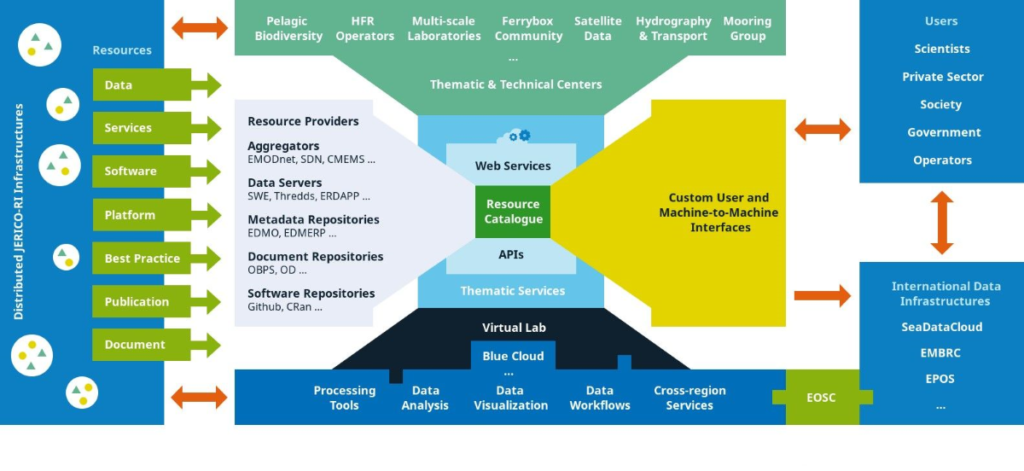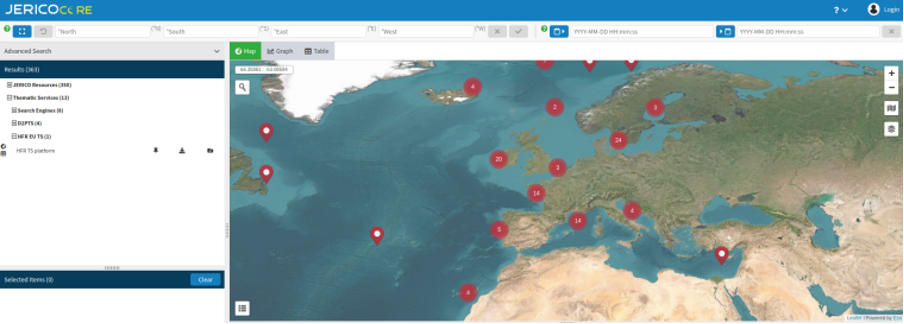In a significant leap forward for marine research, the Joint European Research Infrastructure of Coastal Observatories (JERICO) is spearheading the creation of an integrated central hub e-infrastructure to facilitate the discovery, access, management, and interaction with a broad spectrum of coastal ocean resources. These encompass a graph of interconnected assets, including services, datasets, software, best practices, manuals, publications, organisations, projects, observatories, equipment, support, training, and similar entities. Moreover, this e-infrastructure includes a Virtual Research Environment (VRE) that fosters collaboration.
To materialise this vision, the JERICO Coastal Ocean Resource Environment (CORE) pilot was developed under JERICO-S3 and is operational in Datarmor. This pilot is designed to aid JERICO partners in their exploration of technologies and capabilities that will underpin future endeavours, driving towards the realisation of a European Coastal Observatories Research Infrastructure . The aim is to compile JERICO’s assets by sourcing information from primary data and information providers, which encompass EMODnet, SeaDataNet, Copernicus Marine In Situ Thematic Assembly Center, the Ocean Best Practice System (OBPS) and other marine RI. Navigating JERICO-CORE’s catalog becomes seamless via the user interface that follows the European Plate Observing System (EPOS) e-infrastructure design. Additionally, a dedicated API allows machine-to-machine access, enabling smooth integration with international infrastructures.
 The JERICO-CORE pilot VRE results from the partnership between JERICO and Blue-Cloud. This synergy empowers the development of assessment tools that delve deeply into JERICO’s capabilities. These tools serve as essential refinements to knowledge derived from diverse ocean resource providers. They provide insights into various facets of the resource catalog,
The JERICO-CORE pilot VRE results from the partnership between JERICO and Blue-Cloud. This synergy empowers the development of assessment tools that delve deeply into JERICO’s capabilities. These tools serve as essential refinements to knowledge derived from diverse ocean resource providers. They provide insights into various facets of the resource catalog,
ranging from duplicate identification to resource type and source quantification. Beyond mere enumeration, these tools will extend to measuring the presence of Essential Ocean Variables (EOVs) within the community’s datasets or platforms and effectively ensuring the adherence to JERICO’s Data Management Plan. The impact of JERICO-CORE assessment services extends through diverse dimensions of research, spanning key aspects of the EU Open Science policy. For example, by quantifying the contributions of organisations and individuals, JERICO-CORE aligns with the European Commission’s vision through the European Open Science Cloud (EOSC) efforts to change research and FAIR assessment paradigms.
As the months unfold, JERICO-CORE is set to undergo a deeper integration into the Blue-Cloud ecosystem and a comprehensive upgrade of resources, especially software and services, channeled through JERICO-S3 collaborative synergy. JERICO-CORE’s impact extends beyond the culmination of the JERICO-S3 and JERICO-DS projects. A commitment to enhanced interoperability with EOSC is evident as JERICO-CORE expands its service horizons in the context of ongoing and upcoming projects like Blue-Cloud 2026 and OSTrails respectively.
Furthermore, the Coastal Ocean Resource Infrastructure System (CORIS) project emerged as a key initiative of JERICO-CORE, and was endorsed as a UN Ocean Decade Action hosted by the CoastPredict Programme in 2022. With a collaborative approach, CORIS is actively pursuing funding to facilitate global expansion of JERICO-CORE internationally by engaging with repositories such as NCEI, SAEON, and AODN. Thus, JERICO and EU impact can be far-reaching, reshaping the landscape of coastal global ocean research and strengthening Europe’s scientific footprint on a global scale, in particular in the context of the digital twin of the ocean initiatives.

